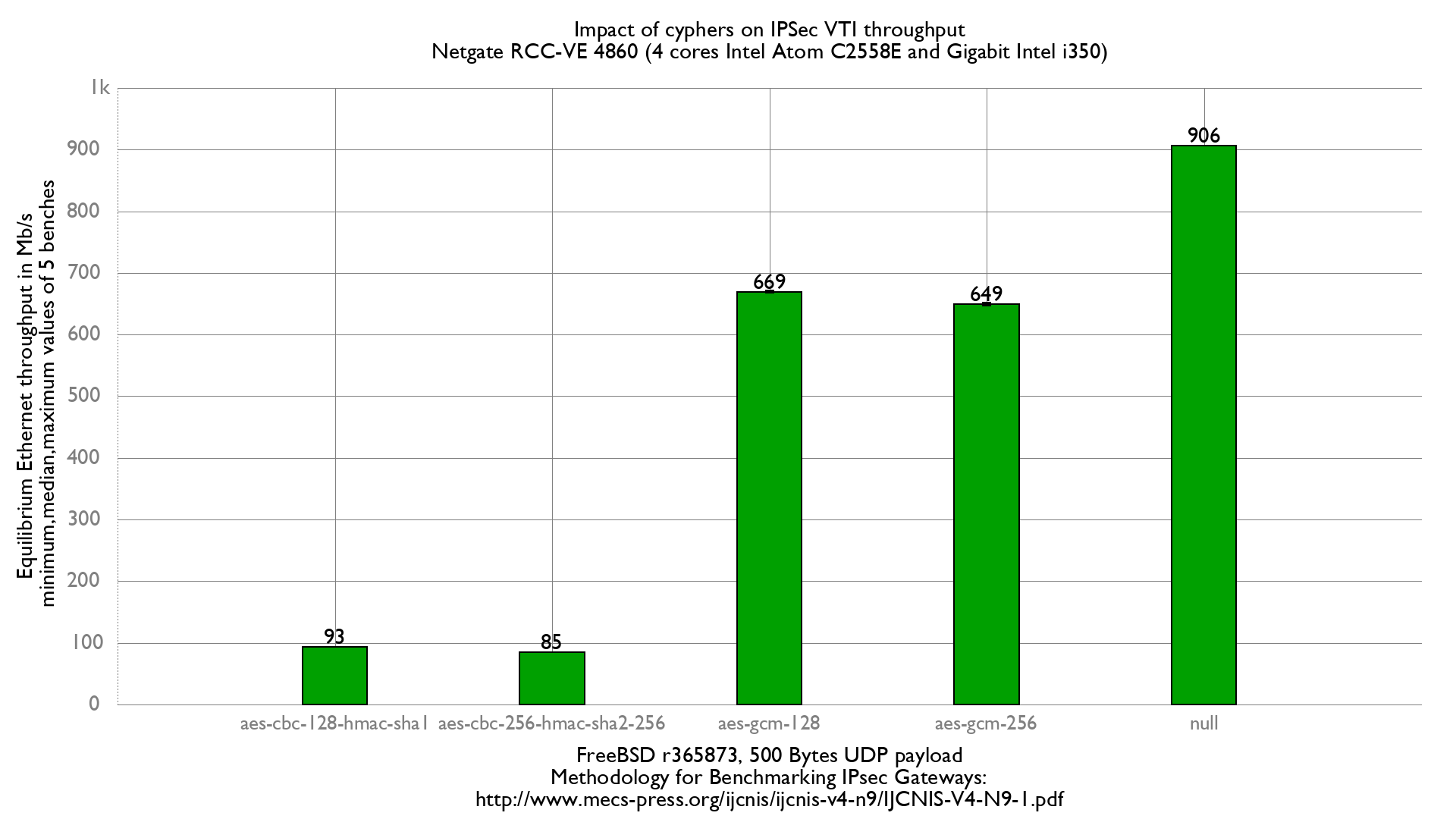documentation:examples:ipsec_performance_of_a_netgate_rcc-ve_4860
- en
- fr
Table of Contents
IPSec performance lab of Netgate RCC-VE 4860
IPSec performance lab of Netgate RCC-VE 4860
Hardware detail
This lab will test a Netgate RCC-VE 4860 (dmesg):
- Quad cores Intel Atom C2558 (2.40GHz)
- AES-NI supporting AES-CBC,AES-XTS,AES-GCM,AES-ICM
- 2 Gigabit Intel i211
- 4 Gigabit Intel i350
- 8Gb of RAM
Method used
The benchmarking method used here is detailed in Setting up a VPN (IPSec, GRE, etc...) performance benchmark lab.
Diagram
+---------------------+ +-------------------------------------+ +----------------------------------------+
| R1 | | Netgate RCC-VE 4860 (AES-NI) | | R3 |
| Packet generator | | Device under Test | | IPSec endpoint |
| and receiver | | | | (AES-NI) |
| | | | | |
|igb2: 198.18.0.201/24|=>=| igb2: 198.18.0.209/24 | | |
| 2001:2::201/64| | 2001:2::209/64 | | |
| 00:1b:21:d4:3f:2a| | 00:08:a2:09:33:da | | |
| | | | | |
| | | igb3: 198.18.1.209/24 |=>=| igb2: 198.18.1.203/24 |
| | | 2001:2:0:1::209/64 | | 2001:2:0:1::203/64 |
| | | 00:08:a2:09:33:db | | 00:1b:21:c4:95:7a |
| | | | | |
| | | ipsec0: 198.18.2.209/24 |...| ipsec0: 198.18.2.203/24 |
| | | 2001:2:0:2::209/64 | | 2001:2:0:2::203/64 |
| | | | | |
| | | static routes | | static routes |
| | | 198.19.0.0/16 => 198.18.2.203 | | 198.19.0.0/16 => 198.19.0.201 |
| | | 198.18.0.0/16 => 198.18.0.201 | | 198.18.0.0/16 => 198.18.2.209 |
| | | 2001:2::/49 => 2001:2::201 | | 2001:2::/49 => 2001:2:0:2::209 |
| | |2001:2:0:8000::/49 => 2001:2:0:2::203| | 2001:2:0:8000::/49=>2001:2:0:8000::201 |
| | | | | |
|igb3: 198.19.0.201/24| | | | igb3: 198.19.0.203/24 |
|2001:2:0:8000::201/64| | | | 2001:2:0:8000::203/64 |
| 00:1b:21:d4:3f:2b | | | | 00:1b:21:c4:95:7b |
+---------------------+ +-------------------------------------+ +----------------------------------------+
|| ||
==================================<===========================================
Devices configuration
Netgate (DUT)
/boot/loader.conf:
# Loading AES-NI module sooner to be sure it is loaded before IPsec keys aesni_load="YES"
Configure IP address, routes and static IPSec:
# IPv4 router gateway_enable="YES" ifconfig_igb2="198.18.0.209/24 -tso4 -tso6 -lro" ifconfig_igb3="198.18.1.209/24 -tso4 -tso6 -lro" static_routes="generator receiver" route_generator="-net 198.18.0.0/16 198.18.0.201" route_receiver="-net 198.19.0.0/16 198.18.2.203" static_arp_pairs="receiver generator" static_arp_generator="198.18.0.201 00:1b:21:d4:3f:2a" static_arp_receiver="198.18.1.203 00:1b:21:c4:95:7a" # IPv6 router ipv6_gateway_enable="YES" ipv6_activate_all_interfaces="YES" ifconfig_igb2_ipv6="inet6 2001:2::209 prefixlen 64" ifconfig_igb3_ipv6="inet6 2001:2:0:1::209 prefixlen 64" ipv6_static_routes="generator receiver" ipv6_route_generator="2001:2:: -prefixlen 49 2001:2::201" ipv6_route_receiver="2001:2:0:8000:: -prefixlen 49 2001:2:0:2::203" static_ndp_pairs="receiver generator" static_ndp_generator="2001:2::201 00:1b:21:d4:3f:2a" static_ndp_receiver="2001:2:0:1::203 00:1b:21:c4:95:7a" cloned_interfaces="ipsec0" create_args_ipsec0="reqid 100" ifconfig_ipsec0="inet 198.18.2.209/24 198.18.2.203 tunnel 198.18.1.209 198.18.1.203" ifconfig_ipsec0_ipv6="inet6 2001:2:0:2::209 prefixlen 64" # Enabling IPsec ipsec_enable="YES"
/etc/ipsec.conf :
flush; spdflush; add 198.18.1.203 198.18.1.209 esp 10000 -m tunnel -u 100 -E aes-gcm-16 "12345678901234567890"; add 198.18.1.209 198.18.1.203 esp 10001 -m tunnel -u 100 -E aes-gcm-16 "12345678901234567890";
R3 (Reference device)
/boot/loader.conf:
# Loading AES-NI module sooner to be sure it is loaded before IPsec keys aesni_load="YES"
Configure IP address, routes and static IPSec. /etc/rc.conf:
# IPv4 router gateway_enable="YES" ifconfig_igb2="inet 198.18.1.203/24 -tso4 -tso6 -lro" ifconfig_igb3="inet 198.19.0.203/24 -tso4 -tso6 -lro" static_routes="generator receiver" route_generator="-net 198.18.0.0/16 198.18.2.209" route_receiver="-net 198.19.0.0/16 198.19.0.201" static_arp_pairs="receiver generator" static_arp_generator="198.18.1.209 00:08:a2:09:33:db" static_arp_receiver="198.19.0.201 0c:c4:7a:da:3c:12" # IPv6 router ipv6_gateway_enable="YES" ipv6_activate_all_interfaces="YES" ifconfig_igb2_ipv6="inet6 2001:2:0:1::203 prefixlen 64" ifconfig_igb3_ipv6="inet6 2001:2:0:8000::203 prefixlen 64" ipv6_static_routes="generator receiver" ipv6_route_generator="2001:2:: -prefixlen 49 2001:2:0:2::209" ipv6_route_receiver="2001:2:0:8000:: -prefixlen 49 2001:2:0:8000::201" static_ndp_pairs="receiver generator" static_ndp_generator="2001:2:0:1::209 00:08:a2:09:33:db" static_ndp_receiver="2001:2:0:8000::201 0c:c4:7a:da:3c:12" cloned_interfaces="ipsec0" create_args_ipsec0="reqid 200" ifconfig_ipsec0="inet 198.18.2.203/24 198.18.2.209 tunnel 198.18.1.203 198.18.1.209" ifconfig_ipsec0_ipv6="inet6 2001:2:0:2::203 prefixlen 64" # Enabling IPsec ipsec_enable="YES"
/etc/ipsec.conf:
flush; spdflush; add 198.18.1.203 198.18.1.209 esp 10000 -m tunnel -u 200 -E aes-gcm-16 "12345678901234567890"; add 198.18.1.209 198.18.1.203 esp 10001 -m tunnel -u 200 -E aes-gcm-16 "12345678901234567890";
Using IPSec bench "Equilibrium throughput" method
Once done, we start using a fast method for measuring the “IPsec equilibrium throughput” of the DUT.
From the packet generator/receiver a simple script that use netmap-pktgen will do the job:
[root@R1]~# equilibrium -4 -u -d 00:08:a2:09:33:da -t igb1 -r igb2 Benchmark tool using equilibrium throughput method - Benchmark mode: Bandwitdh (bps) for VPN gateway - UDP load = 500B, IPv4 packet size=528B, Ethernet frame size=542B - Link rate = 1000 Mb/s - Tolerance = 0.01 Iteration 1 - Offering load = 500 Mb/s - Step = 250 Mb/s - Measured forwarding rate = 499 Mb/s Iteration 2 - Offering load = 750 Mb/s - Step = 250 Mb/s - Trend = increasing - Measured forwarding rate = 670 Mb/s Iteration 3 - Offering load = 625 Mb/s - Step = 125 Mb/s - Trend = decreasing - Measured forwarding rate = 624 Mb/s Iteration 4 - Offering load = 687 Mb/s - Step = 62 Mb/s - Trend = increasing - Measured forwarding rate = 672 Mb/s Iteration 5 - Offering load = 656 Mb/s - Step = 31 Mb/s - Trend = decreasing - Measured forwarding rate = 655 Mb/s Iteration 6 - Offering load = 671 Mb/s - Step = 15 Mb/s - Trend = increasing - Measured forwarding rate = 670 Mb/s Iteration 7 - Offering load = 678 Mb/s - Step = 7 Mb/s - Trend = increasing - Measured forwarding rate = 670 Mb/s Estimated Equilibrium Ethernet throughput= 670 Mb/s (maximum value seen: 672 Mb/s)
Using AES-GCM-128 and aesni kernel module loaded on the NetGate RCC-VE 4860, we can estimate an IPSec Equilibrium throughput of about 672Mb/s.
documentation/examples/ipsec_performance_of_a_netgate_rcc-ve_4860.txt · Last modified: by olivier

